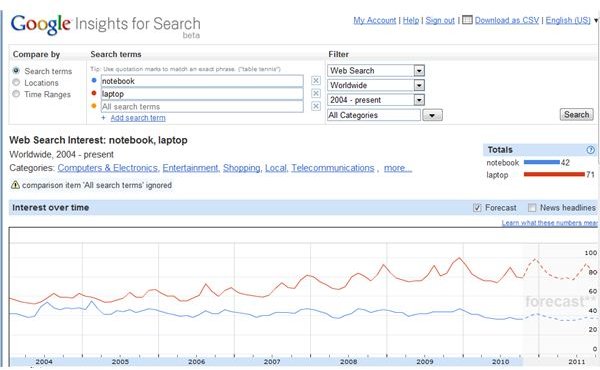Notebook vs Laptop: What is the Difference between Laptop and Notebook Computers?
Portable computers are called many different things. Some of them definitely imply certain qualities about the computers. In Netbooks, Notebooks, Laptops, and Ultralarges, you can read about connotations between different terms for the personal computer. Netbooks are small and extremely portable. Ultralarges, sometimes called studio or desktop replacements, are 18" and bigger computers which still have the flip form factor - that is, they shut like a clamshell and can be moved from location to location, but they are not something anyone wants to lug around often.
There has been a lot of discussion on Netbook vs. Notebook - and that difference is pretty conclusively related to size and weight tradeoffs.
And then there is the middle ground - laptops or notebooks. So, what is the difference between laptops and notebooks?
Notebook vs. Laptop
Some people say there is no difference between a notebook and a laptop, although they distinguish them from netbooks. So is there anything more to the question than the difference between soda and pop - or soda pop?
IBM actually thought there was a difference, or that the term should be used carefully. The term notebook was more accurate, they felt, because many portable computers run so hot, they could not sit comfortably on a lap. Although they have now sold their notebook computer division to Lenovo, their point makes sense.
Portable computers were called notebooks because of the flip top- just like a school notebook once closed.
Notebooks, Laptops and Hot Laps
Does a hot lap make a difference?
Yes, if it is your lap.
SUNY Stoney Brook researchers did a study to find out if laptop computers affected the temperature of the sperm in male users’ reproductive organs. Hyperthermia is a recognized risk factor for male infertility. Their study found that 60 minutes with a laptop on the laps of 23 male volunteers did raise their lap temperature higher than sitting in the same position without a working laptop for the same amount of time. In their conclusion they wrote “Working LC in a laptop position causes significant ScT elevation as a result of heat exposure and posture-related effects.“1
Of course, this do-it-yourself anti-fertility technique, although a potentially last ditch fall back for young males, is even more unreliable than the rhythm method, and should not be used as a form of birth control. Besides, it sounds quite uncomfortable.
Another group of researchers at the University of Connecticut Health Center looked into a case of lesions on the thighs of a woman. “After an extensive workup, she was diagnosed with erythema ab igne caused by laptop computer use.” 2 It healed after three months without direct laptop on the lap use.
If you habitually do use a laptop on your lap, you may want to consider using either a laptop cooling pad or a laptop desk to keep the heat from reaching you. There are a number of different options which will keep you comfortable and free from suffering either issue.
1 Increase in scrotal temperature in laptop computer users; Sheynkin Y, Jung M, Yoo P, Schulsinger D, Komaroff E; Hum Reprod. 2005 Feb;20(2):452-5. Epub 2004 Dec 9.
2 Laptop computer–associated erythema ab igne; Levinbook WS, Mallett J, Grant-Kels JM; Cutis. 2007 Oct;80(4):319-20
Different Ideas From Different People
Apple seems to use notebook when discussing the MacBook and MacBook Pro. Some other manufacturers use the words interchangeably, as do most retailers on and offline.
Looking at different definitions on the web, there seems to be a certain group of people who think a notebook is smaller than a laptop. According to Webopedia a notebook computer is “(n.) An extremely lightweight personal computer. Notebook computers typically weigh less than 6 pounds and are small enough to fit easily in a briefcase.”
The public, or at least that part of it that searches on Google, uses laptop more often than notebook, and has consistently throughout the period since 2004, according to Google Insight data. So, is there a difference between a laptop and a notebook? That’s for you to decide.
Screenshot by author https://www.google.com
